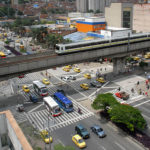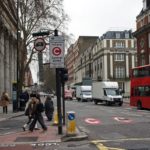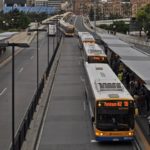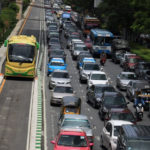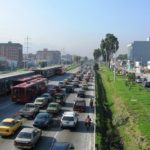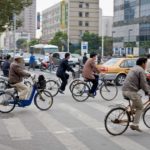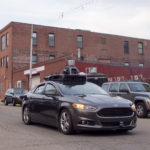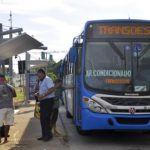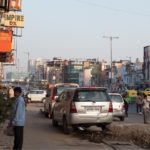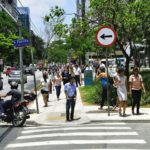Recent Posts by Darío
At a recent Latin American Development Bank (CAF) Infrastructure for Development Conference in Buenos Aires, regional experts and policymakers delved into the unique urban landscape for the area, from early approaches to modern challenges around inequality and better service. Pre-Incan ...

“Toward Car-Free Cities,” a blog series by WRI Ross Center for Sustainable Cities’ Urban Mobility Team, explores the challenges and opportunities for Transport Demand Management (TDM) strategies. TDM focuses on reducing the demand for private vehicles through combining public policy ...

Autonomous vehicles (AVs) are already being tested in California, Pittsburgh, Singapore, Paris and Oslo. As they spread, they are becoming a natural flashpoint for debate. Proponents of AVs point to their promise of a safer, faster, cleaner and more convenient ...

“Ride-hailing” or “ride-sourcing” companies like Uber, Easy Taxi, Ola and Didi have made it much easier for passengers to get around cities everywhere, providing real-time location data, increasingly accurate arrival times, seamless payment and customized services. Goldman Sachs estimates the ...

The world’s great public transit systems: Tokyo’s Metro, London’s Tube, Hong Kong’s MTR…and Mexico City’s bus rapid transit corridors? Trains are often seen as the pinnacle of modern urban transport infrastructure. They’re green and efficient, supported by permanent, complex track ...

Some time ago, professor Christo Venter of the University of Pretoria sent me an intriguing message: Did I have data on how bus rapid transit systems, or BRTs, affect equity in cities? Impact evaluations for changes in travel time, cost, ...

“Toward Car-Free Cities,” a blog series by WRI Ross Center for Sustainable Cities’ Urban Mobility Team, explores the challenges and opportunities for Transport Demand Management (TDM) strategies. TDM focuses on reducing the demand for private vehicles through combining public policy ...

The Transportation Research Board (TRB) 96th Annual Meeting will be held in Washington D.C. on January 7-12. The meeting program will cover all modes of transportation, with more than 5,000 presentations in over 800 sessions and workshops, addressing topics of interest ...

The construction of urban highways continues in many places. In Latin America, we see ongoing projects in Santiago (Américo Vespucio Oriente), Lima (Línea Amarilla), Quito (Solución Vial Guayasamín), São Paulo (Rodoanel Mário Covas) and Mexico City (Segundo Piso a Cuernavaca), ...

Habitat III in Quito was the largest UN meeting to date, with more than 36,000 people from 167 countries, thousands of organizations and institutions, hundreds of meetings and side events and the adoption of the New Urban Agenda (NUA). Habitat ...

Urban leaders from around the world are meeting in Quito, Ecuador, October 17-20, 2016, to set the global agenda for the future of cities at the United Nations Conference on Housing and Sustainable Urban Development, known as Habitat III. Through ...

The future is here, or it is very close: Uber announced “driverless” car services in downtown Pittsburgh; nuTonomy, a MIT spin-off technology company, just started commercial trials of autonomous taxis in Singapore. These developments come way before car manufacturers and ...

The Olympics have given us the opportunity to meet the wonderful city of Rio de Janeiro. The landscape of Guanabara Bay, the famous beaches, Sugarloaf Mountain, Lagoa and the tropical forest are so beautiful, it feels natural that the Portuguese ...

With 26 million inhabitants, Delhi’s metropolitan area is the fifth largest in the world. But the city also has terrible air quality, with an annual average particulate matter 15 times the recommendation of the World Health Organization. Air pollution is ...

At a training session at the World Bank in Washington, DC two years ago, Dr. Kavi Bhalla from the Johns Hopkins Bloomberg School of Public Health asked attendees to look down at the palms of their hands. The meeting included ...

 Lester Roberts
yes and we need to inquire about
-how many suicides are avoided/caused by road design that inhibits social interactions
-The economic impact of child...
Lester Roberts
yes and we need to inquire about
-how many suicides are avoided/caused by road design that inhibits social interactions
-The economic impact of child...
 Lester Roberts
disabled population is included in the pedestrian population. They have priority access to sidewalks, all other users must yield to them
Lester Roberts
disabled population is included in the pedestrian population. They have priority access to sidewalks, all other users must yield to them
 Erik Moedt
Any thoughts on updates on this or links to updated versions? Now in 2025 we have seen dockless such as ofo, scooters, and hybrid docked lite models....
Erik Moedt
Any thoughts on updates on this or links to updated versions? Now in 2025 we have seen dockless such as ofo, scooters, and hybrid docked lite models....







